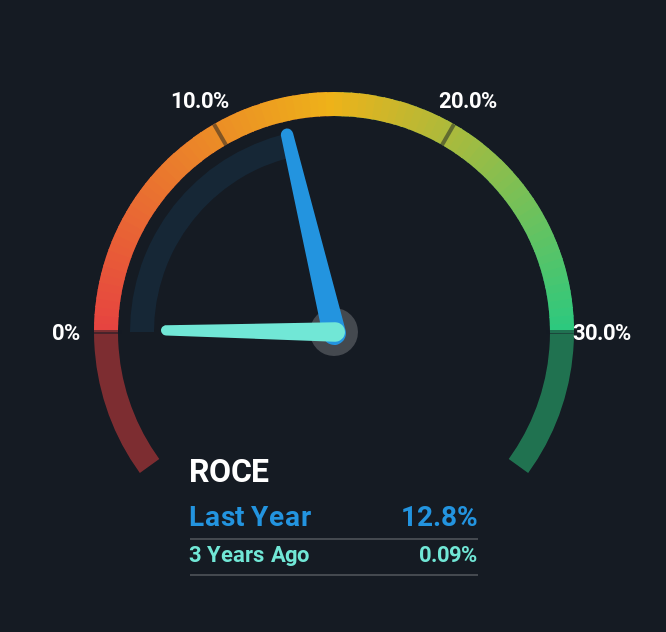- Hong Kong
- /
- Trade Distributors
- /
- SEHK:1539
Unity Group Holdings International (HKG:1539) Is Doing The Right Things To Multiply Its Share Price
If you're not sure where to start when looking for the next multi-bagger, there are a few key trends you should keep an eye out for. Firstly, we'd want to identify a growing return on capital employed (ROCE) and then alongside that, an ever-increasing base of capital employed. Basically this means that a company has profitable initiatives that it can continue to reinvest in, which is a trait of a compounding machine. So when we looked at Unity Group Holdings International (HKG:1539) and its trend of ROCE, we really liked what we saw.
Return On Capital Employed (ROCE): What Is It?
If you haven't worked with ROCE before, it measures the 'return' (pre-tax profit) a company generates from capital employed in its business. Analysts use this formula to calculate it for Unity Group Holdings International:
Return on Capital Employed = Earnings Before Interest and Tax (EBIT) ÷ (Total Assets - Current Liabilities)
0.13 = HK$25m ÷ (HK$566m - HK$369m) (Based on the trailing twelve months to March 2025).
Therefore, Unity Group Holdings International has an ROCE of 13%. On its own, that's a standard return, however it's much better than the 5.9% generated by the Trade Distributors industry.
View our latest analysis for Unity Group Holdings International

While the past is not representative of the future, it can be helpful to know how a company has performed historically, which is why we have this chart above. If you want to delve into the historical earnings , check out these free graphs detailing revenue and cash flow performance of Unity Group Holdings International.
So How Is Unity Group Holdings International's ROCE Trending?
You'd find it hard not to be impressed with the ROCE trend at Unity Group Holdings International. We found that the returns on capital employed over the last five years have risen by 2,023%. That's a very favorable trend because this means that the company is earning more per dollar of capital that's being employed. In regards to capital employed, Unity Group Holdings International appears to been achieving more with less, since the business is using 43% less capital to run its operation. Unity Group Holdings International may be selling some assets so it's worth investigating if the business has plans for future investments to increase returns further still.
On a side note, we noticed that the improvement in ROCE appears to be partly fueled by an increase in current liabilities. The current liabilities has increased to 65% of total assets, so the business is now more funded by the likes of its suppliers or short-term creditors. And with current liabilities at those levels, that's pretty high.
The Key Takeaway
From what we've seen above, Unity Group Holdings International has managed to increase it's returns on capital all the while reducing it's capital base. And with the stock having performed exceptionally well over the last five years, these patterns are being accounted for by investors. Therefore, we think it would be worth your time to check if these trends are going to continue.
On a separate note, we've found 1 warning sign for Unity Group Holdings International you'll probably want to know about.
While Unity Group Holdings International may not currently earn the highest returns, we've compiled a list of companies that currently earn more than 25% return on equity. Check out this free list here.
New: AI Stock Screener & Alerts
Our new AI Stock Screener scans the market every day to uncover opportunities.
• Dividend Powerhouses (3%+ Yield)
• Undervalued Small Caps with Insider Buying
• High growth Tech and AI Companies
Or build your own from over 50 metrics.
Have feedback on this article? Concerned about the content? Get in touch with us directly. Alternatively, email editorial-team (at) simplywallst.com.
This article by Simply Wall St is general in nature. We provide commentary based on historical data and analyst forecasts only using an unbiased methodology and our articles are not intended to be financial advice. It does not constitute a recommendation to buy or sell any stock, and does not take account of your objectives, or your financial situation. We aim to bring you long-term focused analysis driven by fundamental data. Note that our analysis may not factor in the latest price-sensitive company announcements or qualitative material. Simply Wall St has no position in any stocks mentioned.
About SEHK:1539
Unity Group Holdings International
An investment holding company, engages in the leasing and trading of energy saving products.
Solid track record with adequate balance sheet.
Market Insights
Community Narratives




